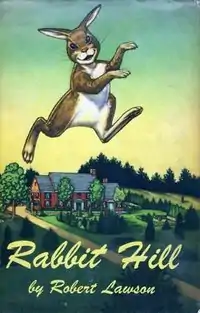Rabbit Hill
Rabbit Hill is a children's novel by Robert Lawson that won the Newbery Medal for excellence in American children's literature in 1945.[1]
 Book cover | |
| Author | Robert Lawson |
|---|---|
| Illustrator | Robert Lawson |
| Country | United States |
| Language | English |
| Genre | Children's novel |
| Publisher | The Viking Press |
Publication date | 1944 |
| Media type | Hardcover, paperback |
| Pages | 127 pp |
| Followed by | The Tough Winter |
Plot introduction
The story takes place in the countryside near Westport, Connecticut. The animal inhabitants are suffering as the house nearby has been abandoned for several years and the untended garden, the animals' source of food, has withered to nothing. "New Folks" then move into the house: Are they hunters, or friendly gardeners who will provide for the animals?
Literary significance and criticism
The book was written at the end of World War II when racial integration and providing aid to the war torn countries of Europe were on everyone's minds. When reading the story with those in mind, the moral intent becomes clear. Printings of the book beginning in the 1970s and continuing today have edited the character Sulphronia, the new occupants' cook. This was done because she was originally depicted as an African American stereotype.[2]
Rabbits' memories of human wars
The book includes a depiction of how human wars seem to the animals living through them: "Why, look at this here very road we’re a travelin' along. I mind my grandfather tellin' me how his grandfather told him how his grandfather used to tell about the old, old days and how the British red-coat soldiers come atrampin up this road, clear up Danbury way, a-roarin' and a-shootin' and aburnin' of the houses and the barns and the crops, an' how the Folks hereabouts came a-rampagin and a-shootin' of them. And a lot of them was buried right in these here orchards and al the homes was gone and all the critters and the food was gone and they was Bad Times then-real bad. But them soldiers went away and them times went away and there was always new Folks comin' and new times comin'. Us folks [rabbits] just went on a-raisin' of our young ones and a-tendin' to our own affairs, but new Folks kept acumin and after a while this here whole valley was full of little mills and factories and all them fields there along the High Ridge was growin' thick with wheat and potatoes and onions and Folks was everywhere and the big wagons n-rumblin' and a-rollin' along this very road, just a-spillin' out grain and hay and all. Them was Good Times, for everybody. But then pretty soon all the young men Folks went a-marchin' down this here road. all of'em wearin' blue uniforms. a-singin' an' a-laughin' an' carryin' paper sacks of cookies an' flowers stuck into their guns. Most of them never come hack, an' the old Folks petered out or went away an' the mills fell in an' the fields growed up in weeds an' then it was Bad Times again. But Grandad and Granmammy just went on a-raisin' us and tendin' their own business an' then there was new Folks comin' again, an' black roads an' new houses an' schools an' automobiles an first thing yell know it was Good Times again."
Film and television
Little Georgie of Rabbit Hill was a 1967 television adaptation for NBC Children's Theatre.
References
- Hahn, Daniel (2015). The Oxford Companion to Children's Literature (2nd ed.). Oxford. University Press. p. 485. ISBN 9780198715542.
- Peterson, Linda Kauffman; and Marilyn Leathers Solt. Newbery and Caldecott Medal and Honor Books, an Annotated Bibliography, G.K. Hall & Co., 1982.
| Awards | ||
|---|---|---|
| Preceded by Johnny Tremain |
Newbery Medal recipient 1945 |
Succeeded by Strawberry Girl |